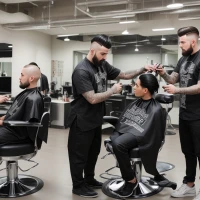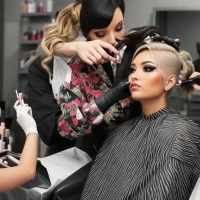Welcome to the all-encompassing guide on embarking onto the vibrant path of beauty – a journey that blends creativity, style, and meticulous skill. When considering a career in cosmetology, a burning question is often “How much training does it take to become a cosmetologist?” This comprehensive exploration is designed to provide clarity on how a cosmetology program can shape your future, deliver insights into the extensive training involved, and secure a strong foundation in an industry pulsing with opportunity.
As beauty continues to advance and transform, those aspiring to be a part of this dynamic industry will find themselves seeking the finest programs to illuminate their expertise. It’s not merely about mastering the use of brushes and scissors but nurturing a robust knowledge that spans the latest trends, techniques, and treatments. A cosmetology program is the crucible where raw passion is meticulously crafted into professional prowess. Let’s delve deeper into the complexities and commitments of cosmetology training and pave the way for unlocking career secrets that will set you apart in the realm of beauty.
Essential Foundations in Cosmetology Training
Cosmetology programs serve as the launchpad for entering the beauty industry. Successful professionals in the field possess a blend of technical skills, innovative thinking, and an ever-evolving toolbox of knowledge. To achieve this, one must begin with understanding the rigorous training that forms the cornerstone of a beauty career.
Related article; Why is My Hair Dry and Stiff?
Understanding the Spectrum of Beauty Disciplines
Before you can gauge the intensity and time investment of your training, it is pivotal to discern the myriad avenues within the field:
Related article; Everything You Need to Know About Acrylic Nails
- Haircare - including cutting, coloring, styling, and treatments
- Skincare - mastering facials, extractions, and various skin health techniques
- Nail Services - such as manicures, pedicures, and nail art
- Makeup Application - understanding color theory and makeup techniques
- Barbering - a more specialized focus on men’s grooming and haircuts
- Esthetics - targeting advanced skin treatments and beauty technologies
A comprehensive cosmetology program may encompass all these areas, allowing for a well-rounded education that opens numerous doors for specialization and career advancement.
Related article; Barbers vs. Hairdressers: What’s the Difference?
Duration of Cosmetology Programs
The length of a cosmetology program hinges greatly on state regulations and the hours required by licensing boards. On average, it may take anywhere from several months to two years to complete the necessary training. Full-time commitment often leads to certification in less than a year, while part-time tracks logically extend the time frame.
Related article; Nail Trends To Level Up Your Manicure in
State Licensing Requirements
Every aspiring cosmetologist must understand that licensing requirements vary significantly from state to state. Typically, a set number of training hours, ranging from 1,000 to over 2,300 hours, is mandated before licensure can be conferred. It’s not unusual for students to dedicate 40 hours per week to their training - translating to an immersive, intensive experience quite akin to a full-time job.
Related article; A Professional Skin Consultation is Ideal for Optimal Skincare
Choosing a Reputable Cosmetology School
Selecting the right institution is not only about the proximity or cost but also the quality of education. Reputable schools are often accredited by bodies such as the National Accrediting Commission of Career Arts & Sciences (NACCAS), ensuring that students receive education that meets industry standards and is recognized by professionals nationwide.
Related article; A Guide to Opening and Operating a Salon
Navigating the Practicalities of Cosmetology Education
With a firm understanding of the basics, let’s navigate the day-to-day aspects of what cosmetology training involves and how it prepares you for a successful career.
Related article; When Should You Raise Your Rate?
Skill Acquisition Through Hands-On Learning
Cosmetology is distinctively hands-on, requiring the physical application of skills learned in the classroom. From mannequin heads for initial practice to eventually transitioning to real clients at student salons, students systematically build confidence and competency in their craft.
Related article; How to Improve Engagement through Tagging on Social Media
Perfecting Techniques
Daily, students fine-tune their technical prowess under the supervision of seasoned instructors. Each brush stroke, snip, and polish application is purposeful, gradually perfecting techniques that will become second nature once in the professional arena.
Business-Savvy Lessons for Aspiring Entrepreneurs
Many programs extend beyond just the creative, embedding business and marketing principles integral for those aiming to start their salons. Understanding the business landscape of beauty is indispensable in today’s competitive world.
Specializations and Advanced Trainings
For individuals aspiring to surpass the generalist role, specializations offer an avenue to become prominent experts within the industry.
Advanced Certifications
Post-graduation, many cosmetologists invest in further certifications. These are not only pivotal for bridging knowledge gaps but are a testament to one’s dedication and expertise. They may focus on areas such as:
- Clinical esthetics
- Trichology
- Permanent makeup
- Laser hair removal
Earning such advanced certifications ascertains enhanced skills, allowing cosmetologists to offer a broader spectrum of services to a more discerning clientele.
Grasping the Financial and Time Commitment
The choice to join a cosmetology program is not just a career move – it is also a significant financial and time investment that needs careful consideration.
Understanding Tuition and Additional Costs
The cost of cosmetology school varies widely, with factors like geography, school prestige, and inclusivity of kits and supplies playing major roles. Prospective students should be prepared for expenses to range from a few thousand dollars up to $20,000 or more.
Scholarships and Financial Aid
Thankfully, multiple scholarships and financial aid options exist to ease the burden. From Beauty Changes Lives scholarships to Pell Grants, options are available for those who qualify, emphasizing the importance of thorough research and proactive financial planning.
The Real-World Experience: Internships and Apprenticeships
Didactic learning is fundamental, but nothing rivals the experience of working alongside seasoned professionals in a live setting.
Value of Practical Exposure
Engaging in internships or apprenticeships facilitates not only the enhancement of one’s skillset but also provides a glimpse into the day-to-day operations of the beauty industry.
Networking Opportunities
These opportunities serve as prime moments for networking, creating professional relationships that can propel a fledgling career.
Post-Training: State Board Exams and Licensing
It’s the culmination of effort and dedication – the state board exam. Breezing through this examination hinges on the robustness of one’s training.
Preparing for the Exam
A significant component of any program should include preparation for both the written and practical sections of the state board exam. Mastery of the curriculum and hands-on proficiency are put to the test, proving one’s eligibility to claim the coveted title of a licensed cosmetologist.
Ongoing Education for License Renewal
Post-licensure, education does not cease. States usually require periodic continuing education for license renewal, which ensures that cosmetologists remain abreast of evolving trends and safety regulations.
Crafting a Dazzling Portfolio
A standout portfolio mirrors a cosmetologist’s artistic voice and technical mastery – enticing potential employers and clientele alike.
Documenting Your Work
As a tool for showcasing your work, a portfolio is a vital asset. Documenting transformative haircuts, stunning makeup looks, and superior nail designs builds a visual narrative of one’s skills, creativity, and growth.
Leveraging Digital Platforms
In the digital age, online portfolios have become paramount. Platforms like Instagram double-up as powerful marketing tools, offering a platform to a global audience and potential connections to industry influencers.
Conclusion: Investing in Your Future
The journey through a cosmetology program is multi-faceted, challenging, and ultimately rewarding. Whether through sculpting the perfect coiffure, rendering skin luminous, or crafting immaculate nails, the investment in knowledge, time, and resources emboldens your entrance into an industry that celebrates transformation and personal expression. Your training paves the way for not just a job, but a career filled with continuous learning, artistic freedom, and the joy of enhancing beauty in all its forms.
From theory to technique and business acumen to practical experience, every hour of training is a stepping stone to becoming a consummate professional. The beauty industry is an ever-expanding arena, and a well-executed cosmetology program is the nexus where career dreams are forged into reality. With dedication and perseverance, the secrets of the beauty world unlock, revealing a path of limitless potential and the promise of a flourishing career.










